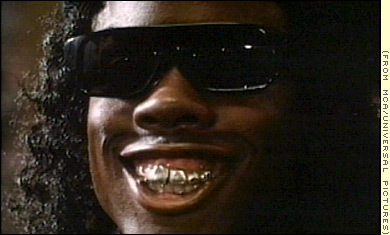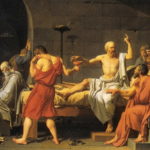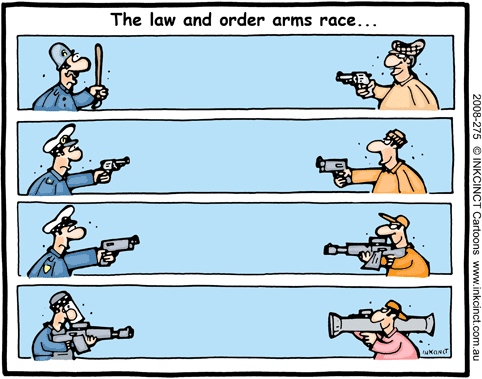The first time I heard Sweat From My Balls . . .”
If there was any universal lesson about pop culture and the twentieth century, I suppose it should have been to never underestimate the ability of the next generation to extend the boundaries of noise, venom, and world threatening bad taste. When I was in college, I used to wonder how things could ever get any more menacing to the adult world than punk rock. How was it conceivably possible for people raised on punk to be confronted with anything more threatening, nihilistic, and loud? In the end we all underestimated rap.
It seemed at the time to me to be not much more than a one note novelty act. I remember being fairly entertained by the more melodic efforts that hit the charts like Young MC’s “Bust a Move” and De La Soul’s “Me Myself and I”, but the possibility that rap would become as diverse and dominant a force as it is today seemed totally out of the question to me until Public Enemy released It Takes a Nation of Millions to Hold Us Back. That album took the argument that rap music was nothing but random noise and threw it back in the face of the music world with screeching police sirens, sounds of random gunfire, and the intense anger of Chuck D’s Marv Albert impression that he accurately labeled “lyrical terrorism.” At it’s core I never really found Public Enemy to be all that frightening because I understood where they coming from. They might be singing about an armed insurrection into Arizona, but they were all about letting out their violence in the rage of their music.
Then came NWA’s Straight Outta Compton, and all hell broke loose. Before NWA, Tipper Gore’s panties were all in a knot about suggestive Prince songs. Tipper and her cohorts used to spend all night playing Erotic City over and over again desperately trying to see if they could figure out whether Prince was saying funk or fuck in the chorus. Then came NWA’s Fuck tha Police. Ratings stickers? Sure put em on our albums we don’t care. This was truly scary stuff. Tales of gangland violence, pimping, altercations with the police, drive by shootings, drug dealing, guns galore, and the omnipresence of the word motherfucker. Rappers use the word motherfucker more than The Beatles used love, peace and pronouns. Of course the thing that scared the bejesus out of those soccer moms who were really paying attention was that suburban white kids started eating this up like it was covered in sugar. Imagine how cool guys who don’t listen to the police are to kids who don’t want to listen to their parents. These guys don’t speak your language you have to learn to speak theirs. Who wouldn’t rather be known as Ghostface Killa or Shock G. After all Rock and art and stuff have a long history of middle class hipsters desperately grabbing on to lower class cool. Pretty soon rapper replaced athlete as the best way out of the hood, and how could anyone resist these packing cowboys with street smart style. As long as they stayed out of court and didn’t get killed, rappers could seemingly get away with anything, and rap albums were like a doorway into the life of gangster hustler cool without having to be poor. Millions of kids said I don’t want to work at Burger King either, and somewhere around Bulworth Warren Beatty decided he agreed. Unfortunately as fascinated liberals waxed poetic about poetry from the oppressed streets and the rest of the world increasingly swung to the dope beats that Dr. Dre and his followers were dishing out, some truly frightening stuff started going on. Folks started shooting each other. Of course that only made things that much more interesting.
Look how quaint those punks seem nowadays shaking their fists, spitting, swearing, maybe leaving behind a bit of vandalism and vomit in their wake. At it’s worst the nihilism of punk led to a bunch of overdoses, accidental murders, and suicides, but rappers started hanging out in packs, threatening to kill cops, and shooting each other. Remember how bad Vanilla Ice thought he was until Suge Knight dangled him off a hotel balcony? It got to the point where you didn’t have an ounce of credibility unless you had a couple of citations for felony possession of firearms and a murder charge hanging over your head. Jail for anything outside of drug possession or mere racism was a commitment no one had seriously made in their prime since the badass days of Leadbelly.
Chris Rock’s CB4 is an amusing look at the early days of the gangsta rappers. Before Tupac and Biggie Smalls went down in a hail of gunfire there was always the question of authenticity hanging over their heads. There was widespread suspicion that a lot of these guys grew up a lot more innocently than their press bios claimed even the most innocent of which largely resembled resumes for potential incarceration. CB4’s best joke is that perhaps it didn’t matter. Once you went out on the streets as a gangster the streets were more than happy to reciprocate. It’s essentially Spinal Tap with guns, fat white managers, and gold chains.
Parodying rap acts is almost as old as rap. There was even a Cheers episode where Sam Malone rhymed on the evening news. Rap was so black that it was almost impossible to truly have its own Elvis much less a Pat Boone. Personally I like the fact that rap is so absurd that lots of CB4 almost plays like a documentary you could have actually seen on BET or MTV. For some reason rap fashion looks good for a year or so, upon which time it looks completely ridiculous for eight or nine years before it becomes retroactively funky. Nice threads Hammer!
John Lennon, Pete Townshend, Bob Dylan all those guys had to come home and figure out something to write songs about, but essentially every modern rap record is either about how hard the rapper is, how much cell time he has done, how fly he is, how bad his lawyers are, how cool his threads are, all the fine chicks he has jonesing for his dick, all the money he is making, how everyone is dissing them, all the dope he is smoking … and you thought investment bankers made a lifelong commitment to the lifestyle of their profession. Additionally, as Chris Rock and Nelson George were only too aware any five minutes in the life of 2 Live Crew was worth its weight in comedic gold.
CB4 is a pretty good overview of black pop culture in the early ‘90s. It worships hip hop music, but it isn’t afraid to lob grenades at what it has wrought. It pretty accurately sets it gaze on the absurdity of the gangstas, the newly educated Muslims, the black middle class, and the attention seeking hype inciting alarmism of the white right. It makes a reasonably nice state of the race message, and has what I think is the funniest love scene ever when Chris Rock’s stick thin MC Gusto attempts to get down with a heated fan with a slamming body. It’s the Jimmy Walker booty call all of America was dying to see all those years that Good Times was on the air.
Rock is a suburban rap fan, who worships George Jefferson for his general misanthropy and money grubbing nature. Looking for a rap angle better than wearing fat suits he and his friends steal the hard core identity of a local gangster Gusto who they figure will be locked up forever. I’m pretty sure he’s aping Easy E but he looks a lot like he’s channeling Miles Davis if he hadn’t eaten or bathed in a month. He’s not really credible as a gangster but then again maybe he isn’t supposed to be. Pretty soon they are blowing up as a heavily NWA influenced rap crew. CB4 has pretty much the same things to say about modern Black minstrelsy as Spike Lee’s Bamboozled but it came out seven years or so earlier, wasn’t filmed with an out of focus Sony camcorder, and was actually fun to watch.
Additionally there are cool cameos from real rappers, semi rapper Shaquille O’Neal, The Butthole Surfers, and Halle Berry. Charles Q Murphy as the real Gusto gives what will likely forever be the most menacing performance by the brother of a Saturday Night Live member ever. Although, the movie probably would have been just as funny if they had merely left the camera on Flavor Flav of Public Enemy for two hours in that huge green hat out by the pool.
A final question: Has anyone in history ever been more pleased than Chris Rock is with his “can you sell me just one rib” routine from I’m Gonna Git You Sucka that he reprises here with Isaac Hayes. He’ll eventually be known for his brilliant forays into the meaning of O.J. Simpson and the word nigger, but what he really wants is a mindless laugh every time he says “How much for four French fries?”







